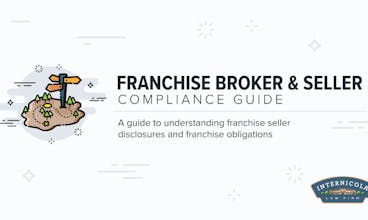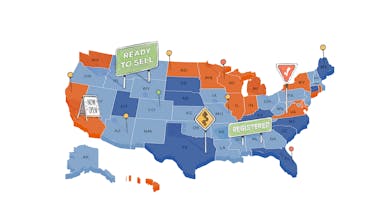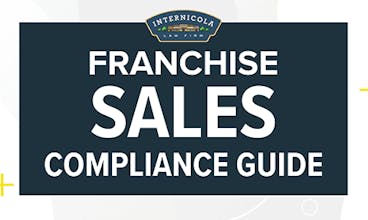A franchise or FDD registration financial assurance requirement is a financial obligation imposed on a franchisor by a franchise state regulator as a condition for registering a franchise disclosure document (“FDD”) or renewing FDD registration. Most commonly, state imposed financial assurance requirements require that, as a franchisor, you agree to one of the following obligations and conditions for FDD registration:
- Deferral of Initial Franchise Fee
An initial franchise fee deferral requirement is a requirement where you agree to not collect initial franchise fees from franchises sold within the state until after you have completed your pre-opening training and support obligations and, in many cases, the franchisee has opened the franchised business. This is one of the most commonly imposed financial assurance requirements and the one most commonly accepted by emerging franchisors as it is relatively easy to satisfy, (i.e. all that is required is an amendment to your FDD) and does not significantly delay FDD registration. However, this financial assurance requirement is the most impactful on the finances of franchisors as it delays receipt of your initial franchise fees and creates future collection risk if your franchisee fails to open. - Escrow of Initial Franchise Fee
An initial franchise fee escrow requirement is a requirement where you agree to deposit the initial franchise fee into an escrow account with an approved bank. Similar to a deferral requirement, you will not have access to these funds until after you have completed your pre-opening training and support obligations and the franchised business is open. Implementing this deferral requirement may delay FDD registration as it will take time to establish a state approved escrow account. This financial assurance requirement will also impact your finances as it delays receipt of the initial franchise fee. Unlike a franchise fee deferral requirement, this escrow condition eliminated future collection risk from a franchisee unwilling to pay the franchise fee in the future. - Posting of a Surety Bond
This financial assurance requirement requires that you purchase and post a surety bond guaranteeing the performance of your pre-opening training and support obligations. In theory the posting of a surety bond is the most favorable financial assurance condition to satisfy in that it allows you to collect the initial franchise fee at the time of signing the franchise agreement. However, in practice the posting of a surety bond, for many emerging franchise brands, is not a realistic option as the bonds are difficult to obtain, are expensive, require personal guarantees, and significantly delay the FDD registration process. The amount of the surety bond will be determined by the state examiner. - Obtaining a Performance Guaranty
This financial assurance requirement requires that you have another company guarantee the financial and performance obligations of your franchise company to your franchisees and the state. When franchisors utilize a performance guaranty, typically the guaranty is given by a financially stronger parent or affiliate company. The advantage of invoking this financial assurance requirement is that you will have immediate access to initial franchise fees. The disadvantage is that another company is now legally and financially responsible to your franchisees. Also, the company granting the performance guaranty must also submit to the state regulator audited financial statements. - Infusing More Capital Into Your Franchise Company
Although not technically a financial assurance requirement, one option may be to improve your finances by infusing more working capital to your franchise company. Once this new capital is infused, you will be required to submit updated audited financials and then request that the state examiner reconsider its decision to impose the financial assurance requirements. To the extent that capital is available, if a state examiner reconsiders its decision and removes the financial assurance requirements, the state may include strict requirements preventing you from removing the capital from your franchise company.
What States Impose a Financial Assurance Requirement?
The states that impose financial assurance requirements, most commonly, include California, Hawaii, Illinois, Maryland, Minnesota, North Dakota, Virginia, and Washington. The State of New York does not impose financial assurance or franchise fee deferral requirements. Instead, if a New York examiner determines that your franchise system does not possess sufficient capital the New York examiner will require that you add a specific risk factor to your FDD State Cover Page.
When is a Financial Assurance Requirement Imposed?
Financial assurance requirements are imposed during the FDD registration and renewal process and as a condition for registration. A financial assurance requirement may be imposed on your franchise system if the state examiner, after reviewing the financial statements included in Item 21 of your FDD, determines that you do not possess sufficient working capital to fund and satisfy your pre-opening training and support obligations on behalf of franchisees within the state.
As a franchisor how much money do you need in the bank and how much working capital do you need to avoid a financial assurance requirement? These are common questions and, unfortunately, there is no specific amount. While the conditions and criteria for financial assurance requirements vary from state-to-state, generally they are determined by the specific state examiner and, generally, the following factors may be considered:
- The amount of your working capital;
- The ratio of working capital to liabilities;
- The amount of your shareholders equity that, typically, must be in excess of $100,000;
- Projected franchise sales within the state; and
- Your operational history within the state.
The State of Virginia is the only state that has set a clear standard as to when they may impose a financial assurance requirement. In Virginia the state examiners sole concern relates to insolvency. Under Section 13.1-562 of the Virginia Retail Franchising Act a financial assurance requirement may be imposed when the an examiner determines that, as a franchisor, you are either "insolvent" or in "danger of becoming insolvent." As to this standard, insolvency exists when either "liabilities exceed assets" or the franchisor cannot satisfy its obligations when they mature.
Next Steps?
During the FDD registration and renewal process it is important to evaluate the potential imposition of financial assurance requirements. The method that you select in satisfying a financial assurance requirement will impact your cash flow and the timing of your FDD registration.



